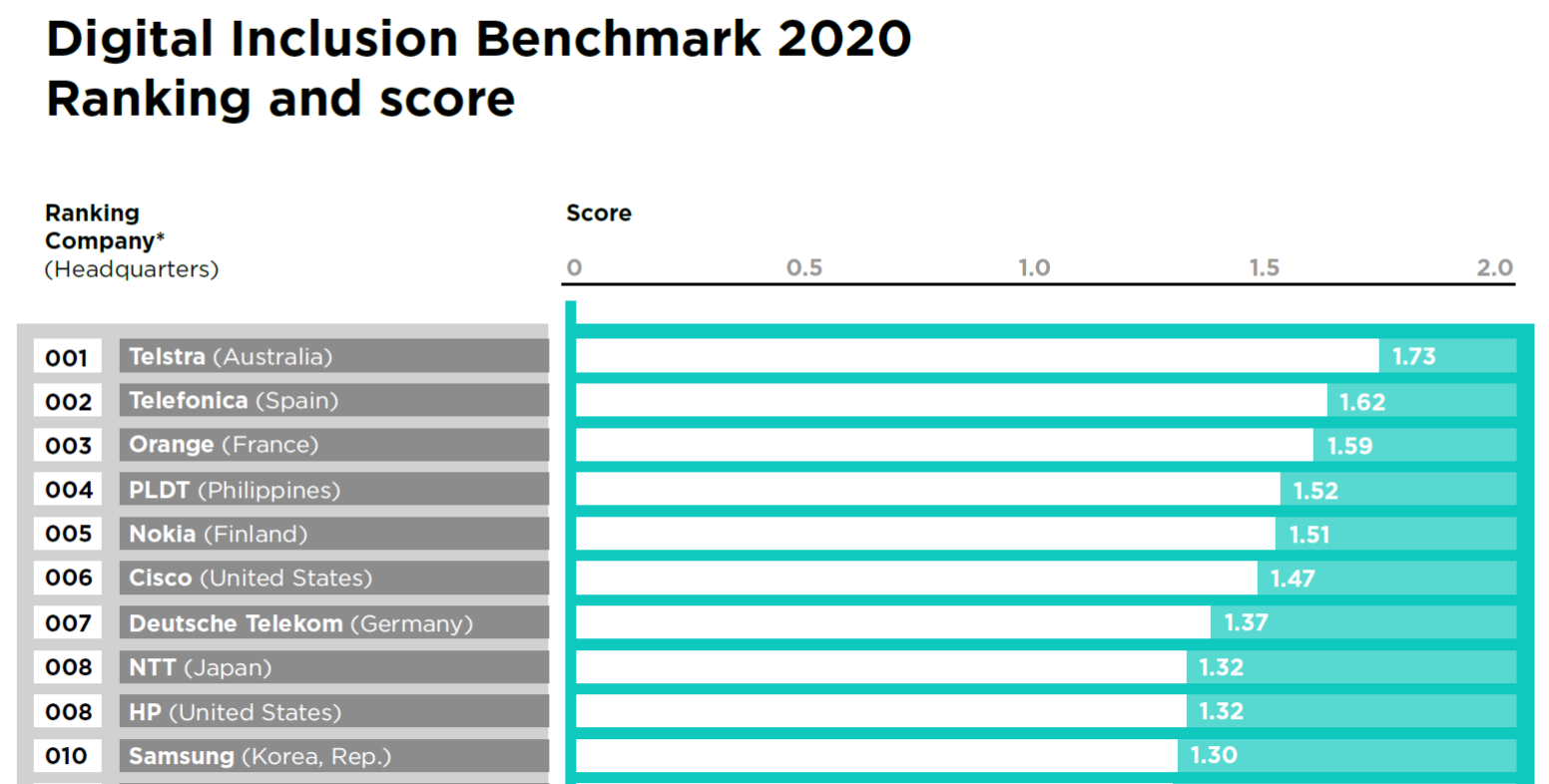The World Benchmarking Alliance (WBA) has today launched the first-ever corporate Digital Inclusion Benchmark, assessing the top 100 most influential technology companies’ progress in improving access to technology, enhancing digital skills, fostering trustworthy use, and innovating openly and ethically. The benchmark divides companies into three categories (hardware, telecommunication services, and IT services) and 33 global economies. They were then assigned scores across a range of inclusion measures including access, skills, use and innovation through a rigorous methodology (detailed here). The Australian telecoms company Telstra emerged top of the list, with a score of 87%, with other companies placing in the top ten including Nokia, HP and Samsung.
Given their outsized role – thanks to their command of capital and technological expertise as well as their ownership of digital infrastructure across the world – the majority of companies are falling seriously short of expectations with notable exceptions at the top of the rankings. While the leaders did achieve high scores, across the full range of global companies, the average score was just 36% of the potential maximum score. European companies are digital inclusion leaders by some margin and split by industry we see hardware and telecommunication services companies having above average scores while IT Services showed low performance.
Lourdes O. Montenegro, Digital Inclusion Lead at WBA said: “The vast majority of the global population rely upon these companies to connect with their work, families and communities; more than ever, their lives are defined by digital. Our research has discovered a disappointing lack of rigour and engagement with digital inclusion policies throughout the tech industry. One finding is that only 16 companies have an explicit high-level statement on child digital safety. This is very concerning given how easy it is for children to be targeted and exposed to harm in the digital world. Overall, the general approach to protection, ethics and inclusion seems to be defined by minimum legal requirements rather than concern for users or the world in general. We see a huge opportunity for change, but companies must take their responsibility as global citizens seriously.”
Privacy, Data and Ethics
The report addresses a current hot topic: companies’ approaches to, and policies for, responsible use of personal data. Overall, when measuring for how well a company applies responsible practices for personal data a disappointing 79% of the companies examined achieve a score of less than 50%. Those at the top of this part of the list, Alphabet and Verizon, scored 82%. We found inconsistent approaches across subsidiaries and locations for single companies, leaving customers of the same company in some areas less protected than others. Given the importance of this subject, and the value personal information has to individuals, there is a missed opportunity for consumer protection here and companies should go beyond minimum legal requirements to implement a universal privacy policy which holds the company to one high standard across all subsidiaries of operation and throughout all regions of the world, regardless of the location of the user.
The use of this data was also subject to investigation. As a driving force behind extracting value from data today, artificial intelligence (AI) is in wide use across most of the companies in the benchmark. However, despite clear pressure and widespread acceptance of the need for rigorous treatment of data and AI within an ethical framework, only 30 companies had evidence that they are considering ethics in Research and Development, and of those just 16 have adopted ethical AI principles.
“As we inch closer to the recovery phase of the COVID-19 pandemic, we need companies to prioritise ethics and safeguards,” continued Lourdes O. Montenegro, Digital Inclusion Lead at WBA. “It’s extremely commendable that at the beginning of the global lockdown many scrambled to mitigate the effects of digital exclusion. By offering discounted services, supporting online education and working with governments and researches to provide access to critical data companies played a huge role in stabilising the situation. But these initiatives also accelerated our dependence on the digital economy. If companies are serious about digital inclusion, we would expect to see them work to ensure data protection privacy and ethics catches up to safeguard the future.”
Software and IT services companies must grow up
One finding of the report is the strong correlation between maturity of the company and its engagement in social responsibility and sustainability efforts. Many of the hardware and telecommunications services companies have long histories and more mature companies were shown to engage with a broad group of stakeholders beyond shareholders and have a physical presence (through manufacturing plants or network infrastructure) that connect them to communities more tangibly. These types of industries are often more heavily regulated than software-based IT services companies, which may also lead to a need for wider stakeholder engagement.
The full 2020 Digital Inclusion Benchmark, including regional and industry breakdowns and individual company scorecards, is publicly available here.
Photo: WBA



